
*
Julie Salamon's "Wendy and the Lost Boys," an authorized biography of the Pulitzer Prize and Tony Award-winning playwright Wendy Wasserstein, has just been published by Penguin Press. Wasserstein's plays include The Heidi Chronicles, The Sisters Rosensweig, Uncommon Women and Others, Isn't It Romantic, An American Daughter and Third, as well as Pamela's First Musical, with songs by Cy Coleman and David Zippel, based on her illustrated children's book.
Salamon, a former reporter and critic with The Wall Street Journal and a former culture reporter for The New York Times, had exclusive access to Wasserstein's private papers, journals and letters and interviewed nearly 300 people in writing the biography of Wasserstein, a beloved figure in New York theatre who died of cancer in 2006 at age 55.
Salamon — whose other books include "Hospital," "The Christmas Tree" and "The Devil's Candy," which is about making the movie version of Tom Wolfe's "The Bonfire of the Vanities" — spoke to Playbill.com about Wasserstein's unique place in American theatre.
Why write a book about Wendy Wasserstein?
JS: She provided a really interesting perspective on a period of time. She was not just a playwright. Robert Brustein [dean of the Yale School of Drama when Wasserstein was a student there] said it as a criticism, but I'm saying it in praise, that she was a dramatic sociologist and historian. She left behind a valuable piece of history about what women of her class and education were thinking at a particular moment in time. She captured a slice of society that was important, that had cultural relevance, and she portrayed it in a way that other people hadn't before and probably won't after. Wendy embodied a lot of the issues of her Baby Boomer generation. The whole notion of what success is has become very murky. Is it to be the richest person? I think self-interest became very much a characteristic of the generation. The '60s was supposed to be about "power to the people," and then it became "power to me." Wendy was grappling with these issues, in her work and in her private life.
| |
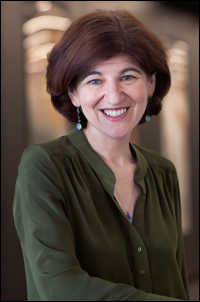 |
|
| Author Julie Salamon | ||
| photo by Sara Krulwich |
JS: We're going to talk about what it was at the time, and then think about it long-term. Long-term's harder to assess, because we never know what's going to be long-term. But at the time her importance was manifold. She was one of the handful of women who achieved pre-eminence as a playwright. She won a Pulitzer and a Tony for Heidi Chronicles [1988, which follows Heidi Holland, an art historian, from high school in the 1960s as she journeys into the 1980s and tries to cope with the evolving roles of women in American society.] Wendy was the first woman to win an unshared Tony.
Did she speak for all Baby Boomers? Of course not. The world she spoke about had a very particularized upper middle class, well-educated sensibility. But boy, did she articulate it. And I think the issues she was talking about, for the generation as a whole but for women in particular, were very profound.
As I interviewed people for this book, whether they knew Wendy or didn't know Wendy, three plays, The Heidi Chronicles, Uncommon Women and Others [1977], and to a lesser extent The Sisters Rosensweig [1992, a semi-Chekhovian serious comedy modeled on her own family about, well, three sisters], spoke to the things that people within this relatively small but powerful universe were thinking about. That's what made her plays so interesting. Uncommon Women is still being performed all over the country, especially in high schools and colleges. That play, about a group of young women at a college very much like Mount Holyoke, where Wendy went to school, still speaks to the issues confronting young women — O.K., you've got this great education, you're going to have this great career, but what about relationships, what about family, how do I balance all of this? And those questions remain very significant for women. They're played out in a different way these days, but those questions remain very important.
How did you come to write this book?
JS: This was the first book I've ever done that wasn't originally my idea. Ann Godoff at Penguin Press has been my editor — this is the fifth book we've done together — and she had been approached by André Bishop, [the artistic director of Lincoln Center Theater], who was a good friend of Wendy's and her literary executor. A few people had been circling around the idea of doing a biography of Wendy, and he was concerned that it wouldn't be done right. He went to Ann and asked if there was anyone interested in doing it, and she called me. Why me? I think it was a combination of things. Even though I had never written about theatre, I wrote about films for The Journal, and then about the cultural world for The Times. Also, Wendy's parents had immigrated from Europe, as had mine. I'm a few years younger, but we were both Baby Boomers. There was a lot we had in common, and also a lot we didn't have in common. Both things were important to Ann. I did a little bit of research into Wendy's family, and I was fascinated about what was known and what wasn't known.
Wendy had a very public persona that she created through her writing — not just the plays but her essays in The Times and elsewhere. [In addition to many autobiographical essays, her works included the screenplay for "The Object of My Affection" (1998) and a novel, "Elements of Style" (2006).] But in her real life she was intensely private: On the one hand she seemed like somebody who had no secrets, and on the other hand she was someone to whom everything was a secret. And that public-private dichotomy and the way she arranged her life was extremely interesting to me.
It was an authorized biography in that André endorsed the project and was very helpful with it but he did not read it until it was in galleys. He had no power of censorship in any way. He was amazingly willing to do that.
| |
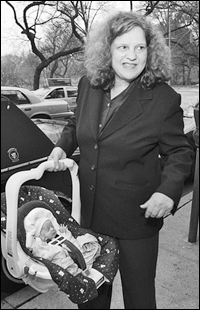 |
|
| Wendy, already showing signs of illness, bringing Lucy Jane home from the hospital. | ||
| Courtesy of the Wasserstein family |
JS: The primary issues about Wendy were: Did she ever have somebody she was really in love with? Who was her daughter Lucy Jane's father? Why did she decide to have a baby at age 48, which was not young? She did this really at the forefront of women who decided to attempt that kind of defiance against biology. What were the forces that motivated her and propelled her through what seemed often like a somewhat chaotic life?
When I started the book I had an idea of her friends, her relationships, her family. I felt I knew a lot — just as many people who lived in New York at the time she was writing knew something about it, and felt they knew a lot. When I began writing, people would ask me, where's Lucy Jane now? Who was her father? The name of her father was something I didn't find out. What I found in the course of doing the research was how much more complicated the answers were than "Lucy Jane's father is X, Wendy had an affair with Y."
Nothing was ever simple with her. She led this extremely compartmentalized life, where she had these intense friendships with people and then intense friendships with other people who may not have known about the other group of people. And she managed all this with business-like acuity that's a little startling. And yet the most startling thing about it is here's this woman who led this unusual life, had a very unusual set of relationships, and yet so many people identified with her and with the dilemmas she faced, the insecurities she felt in spite of all her success, and the inability to keep up in her private life with the changing roles of women. And then the biggest question with Wendy is, what was success?
| |
 |
|
| Wasserstein's high school graduation photo | ||
| Courtesy of the Wasserstein family |
JS: I really didn't want to blame it all on her mother, because that's what people do. And yet it's impossible not to say that Lola Wasserstein was the source of Wendy's success and Wendy's insecurity — and Wendy's way of operating in this world, because Lola kept a lot of secrets, things that didn't need to be secrets. Like the fact that Lola had been married before. That Wendy's father was not the same father as that of her two oldest siblings [Sandra and Abner, her phantom brother who suffered from severe seizures and was hidden away in a special school and largely forgotten]. Wendy didn't find out about her mother's first husband until she was in her 20s.
Wendy was trying to have it both ways. To live in the world of secrets of her parents, and to tell all. And that's really a complicated act. What was Wendy's relationship like with her older brother Bruce, who died in 2009 at age 61? He was an exceptionally powerful figure known for his overwhelming personality.
JS: The two primary forces in her life were her sister Sandra and Bruce. Sandra was 13 years older, and became a parental figure. She's the model for Sara Rosensweig in The Sisters Rosensweig. [Another older sister, Georgette, married early, had children, moved away and became owner of a large Vermont inn.] Bruce and Wendy had the closest and the most contentious relationship. They were three years apart. Each became very prominent in New York City, their hometown. They were very competitive. They both were ambitious. They really loved each other at the same time they competed with each other. They took different paths and they were wary of each other. But in the end Wendy left her daughter to him. When she knew she was dying, she named Bruce as Lucy Jane's guardian.
| |
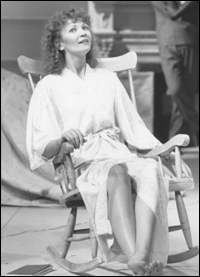 |
|
| Joan Allen in The Heidi Chronicles. | ||
| photo by Gerry Goodstein |
JS: It's not a simple question. The Wasserstein family, with all its fractiousness, was a very close family. Within that family the idea of carrying on the line was extremely important. Just like with everyone else who was born to parents who went through World War II — that's where Baby Boomers came from — everything was about moving forward, not looking back, creating a new generation.
Those lessons were very much imprinted into Wendy's brain. On the other hand, there were the competing messages for women, which were to be successful, or more successful than men, to dedicate yourself to your career. Those messages were often in conflict with that aspect that led her both to want to have and to delay having a baby.
Far more complex is the psychology regarding the men Wendy chose to have relationships with. When she was younger she had serious relationships with men she might have married and had a child with, in a "more traditional" way. She chose not to do that. And then she dedicated herself to picking impossible men. She had a series of gay friends she adored, with whom she flirted with the idea of marriage, and of having a child.
One of the characteristics of Wendy was that she did not always consider the consequences of her actions. In the end, I feel that she never found a man who was as successful as her brother. She never saw a relationship that was as close as her parents'. There was nothing outside that could compare with what had happened inside the Wasserstein family. There is something deliberate about the men she chose to fall in love with, knowing from the outset that there was an impossibility built into the equation.
| |
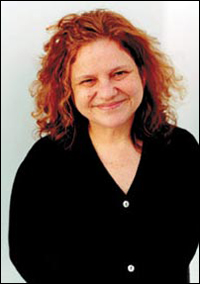 |
|
| Wendy Wasserstein |
JS: Because I started the book soon after Wendy died, in the course of doing more than 300 interviews I found that many people were grieving. People were crying and upset. That was difficult emotionally. And also I think that doing a biography of a contemporary makes you think of all the difficult choices you've made in your own life, about your own family secrets, your own struggles with the issues of the day.
Going through that process definitely changes you. It's both a gratifying and a sobering experience. I met Wendy only once, a long time ago, and I can't say I even knew her casually, yet there were many overlaps in our worlds. We knew many people in common, so there was an eerie sense of familiarity in our lives. It made me reflect.
Which of her plays do you think will last?
JS: I think the plays are a mixed bag. In looking at her papers, in her archives at Mount Holyoke, I saw the way she wrote the plays versus the way she wrote her essays. She would sit down and write everything in longhand.
The essays were written almost verbatim the way they would appear in published form. She would just sit down and write them. But the plays — a play is a work of art — were a huge struggle for her. Her gift was in dialogue and character. Her enemy was structure. She had a really tough time figuring out how to corral the characters and the dialogue and the scenes and the thought within the structure of a play. The plays that I think were the most successful were ultimately when she worked with director Dan Sullivan [for example Heidi, Sisters Rosensweig, Third]. They had a wonderful collaboration, because he was very good in helping her see the structure.
| |
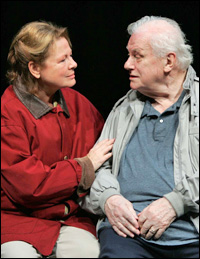 |
|
| Dianne Weist and Charles Durning in Third. | ||
| photo by Joan Marcus |
It's hard for me to evaluate the plays out of the context of Wendy's life, because to me they're so intertwined at this point. Heidi interestingly may wind up seeming the most dated, because it is so much of its moment. It's an interesting play, but I think the character of Heidi is so passive, is such a cipher, that she became a good gathering place for the thoughts people were having at the time. I don't know how well it's going to hold up. Whereas Sisters Rosensweig, which is so much a family story, may last longer. It's probably my favorite. I think she nailed the structural issues. I think it transcends its time better. It has a lot of really great things to say about family relationships. Third [2005, about a liberal college professor who charges a student with plagiarism], a play that not many got to see because it was her last play, has so much intensely beautiful writing. I find it very moving.
I think some of Wendy's best writing is not in her plays. Some of her best writing was in her essays. And the final novel, which is really an unfinished work.
I think she was on to an understanding of her generation and the changing mores and the changing demands on people that I think will hold up over time.
| |
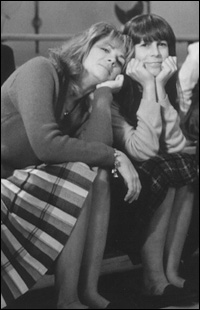 |
|
| Kim Cattrall and Jamie Lee Curtis in the film adaptation of The Heidi Chronicles. | ||
| 1995 Turner Pictures, Inc. |
JS: For people who met her in person, she had an incredible warmth. When I was doing the research, she seemed so nutty to me in the way that she was proceeding with her life. I thought, why did anybody like this person? She could be so mean to people, unintentionally. But whenever I found a video talk by her, of which there are many online, there was something comfortable and warm about her intellect.
She took everything in. Her plays are not directly autobiographical, but they tell a lot of truths. A lot of dialogue in them is, I think, lifted verbatim from life. She did something a lot of people don't do, which is to listen and make the other person feel as if they're in the room. I think that's extremely powerful and extremely rare. And it's also one way she was able to manage to stay so secretive. She was so good at making the other person feel so at home, so listened to, that they didn't notice that sometimes they weren't listening to her. That was her way of deflecting too much probing.
It was also her willingness to express insecurity in a way that was funny. So many of the issues she was dealing with were recognizable to her audience, so when she died people didn't just feel that a playwright had died. They felt that they had lost a dear friend who understood them. And that's a big loss.
A very big loss.
JS: André Bishop said that the tragedy is that Wendy never got her third act. I think that's true. She was maturing as a writer. The sad thing, among many sad things, is that we don't know what would have come next.
Merv Rothstein's work is often seen in the pages of Playbill magazine and Playbill.com. He pens the monthly A Life in the Theatre feature.
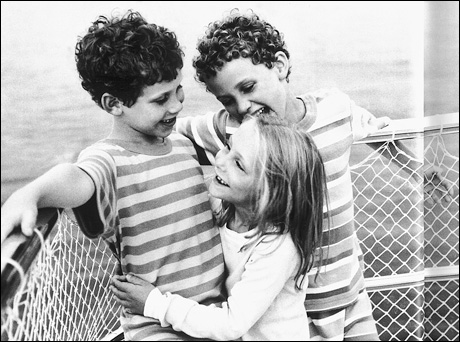 |
| Daughter Lucy Jane (pictured with cousins Jack and Dash) was left in the care of Bruce and Claude Wasserstein. |
| Courtesy of the Wasserstein family |









